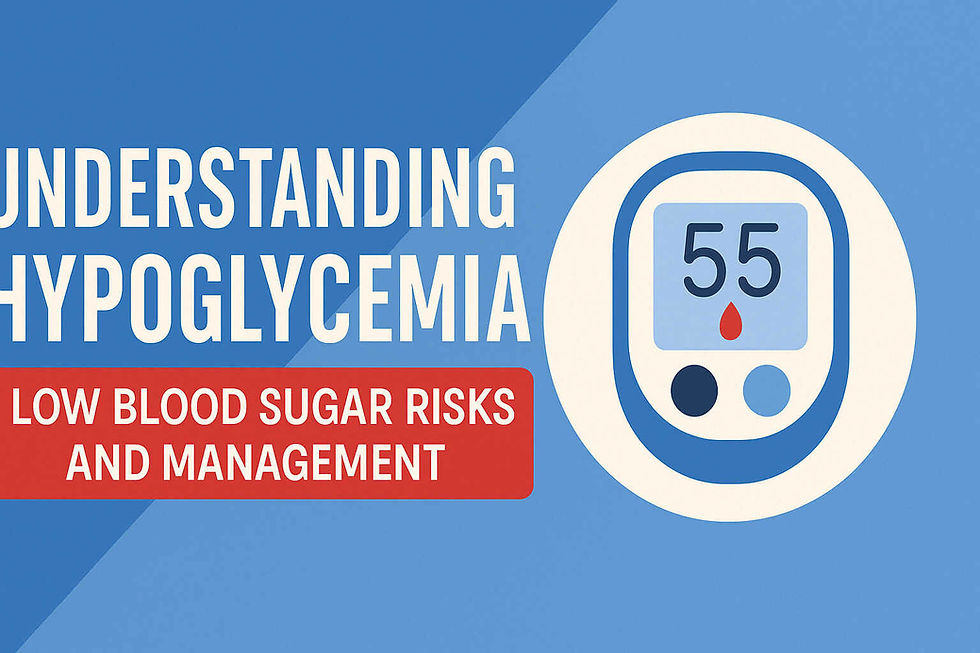Understanding Hypoglycemia: Low Blood Sugar Risks and Management
- evofox59
- Jun 17, 2025
- 4 min read
Hypoglycemia, commonly referred to as low blood sugar, is a condition that occurs when the glucose level in the bloodstream drops below the normal range. It is a serious concern, especially for individuals managing diabetes, as it can lead to dangerous symptoms and even life-threatening complications if not addressed promptly.
In this blog, we will explore what hypoglycemia is, its causes, warning signs, risks, and most importantly, how it can be effectively managed with the right diet and professional guidance from experts like Namita Nadar, the best dietician for diabetes management in noida.

What is Hypoglycemia?
Hypoglycemia is typically defined as a blood glucose level below 70 mg/dL. The body needs glucose as its primary energy source, and when levels fall too low, it can affect brain function and overall physical performance.
Hypoglycemia is most commonly seen in people with diabetes who are on insulin or certain oral medications. However, it can also occur in non-diabetic individuals under specific conditions like fasting, heavy alcohol consumption, or excessive exercise.
Common Causes of Hypoglycemia
Several factors can trigger a drop in blood sugar levels, including:
Skipping Meals: Missing meals or long gaps between meals can lower glucose levels.
Excessive Insulin: Taking too much insulin or diabetes medication can lead to hypoglycemia.
Intense Physical Activity: Prolonged or strenuous exercise without proper carbohydrate intake can deplete glucose stores.
Alcohol Consumption: Drinking on an empty stomach can cause hypoglycemia, especially in people with diabetes.
Hormonal Disorders: Rarely, conditions like adrenal insufficiency can also contribute to low blood sugar levels.
Symptoms of Hypoglycemia
Recognizing hypoglycemia early is crucial. Common signs and symptoms include:
Shaking or tremors
Sweating
Rapid heartbeat
Dizziness or lightheadedness
Irritability or mood changes
Blurred vision
Fatigue
Hunger
Confusion or difficulty concentrating
In severe cases, hypoglycemia can lead to seizures, unconsciousness, or even coma.
Risks Associated with Hypoglycemia
If left unmanaged, hypoglycemia can have serious consequences:
Cognitive Impairment: The brain relies heavily on glucose. Severe hypoglycemia can cause memory loss and coordination issues.
Accidents: Low blood sugar can impair judgment and reaction time, increasing the risk of falls or accidents.
Seizures and Coma: Extremely low glucose levels can lead to life-threatening conditions.
Cardiovascular Stress: Rapid heartbeat and low sugar can strain the heart, especially in older adults.
This makes it essential to have a reliable diabetes management plan, personalized diet, and constant monitoring under the supervision of a specialist like Namita Nadar, the Best Dietician for Diabetes Management in Noida.
How to Prevent and Manage Hypoglycemia
1. Follow a Structured Meal Plan
Eating regular, balanced meals is one of the most effective ways to prevent low blood sugar episodes. Namita Nadar, a top diabetes dietician in Noida, can help design customized meal plans that stabilize blood sugar levels throughout the day.
2. Monitor Blood Sugar Regularly
Frequent monitoring helps you detect drops in blood glucose levels early. It's important to check sugar levels before and after meals, exercise, and whenever you feel unusual symptoms.
3. Carry Fast-Acting Carbohydrates
Always have quick sources of glucose handy, such as:
Glucose tablets
Fruit juice
Sugar candies
If you experience hypoglycemia, consuming 15-20 grams of fast-acting carbs can quickly restore glucose levels.
4. Adjust Medication Dosage
Work closely with your doctor to fine-tune your insulin or diabetes medication doses, especially when your physical activity or dietary patterns change.
5. Plan Exercise Carefully
Physical activity is essential for diabetes management but must be balanced with proper carbohydrate intake. Consult with a dietician like Namita Nadar, the Best Dietician for Diabetes Management in Noida, to create exercise and snack plans that prevent post-workout hypoglycemia.
6. Limit Alcohol Consumption
Drink alcohol in moderation and always consume it with food to prevent delayed hypoglycemia.
7. Educate Family and Friends
Those around you should be able to recognize hypoglycemia symptoms and know how to respond, especially if an emergency arises.
Why Consulting a Dietician is Key
Managing hypoglycemia effectively is not just about medication—diet plays a central role. Personalized diet plans, portion control, proper meal timing, and balanced macronutrient intake can significantly reduce the frequency of low blood sugar episodes.
Namita Nadar, widely recognized as the Best Dietician for Diabetes Management in Noida, provides tailored diabetes diets that help patients:
Maintain steady blood sugar levels
Avoid dangerous sugar drops
Achieve overall better diabetes control
Improve quality of life
Her scientific, practical, and patient-centric approach has helped countless individuals in Noida and beyond manage diabetes safely and effectively.
Conclusion
Hypoglycemia is a potentially dangerous but highly manageable condition when addressed with timely intervention, proper lifestyle adjustments, and professional guidance. Choosing the right dietician, like Namita Nadar, the Best Dietician for Diabetes Management in Noida, can make a significant difference in how well you manage your blood sugar and avoid hypoglycemia risks.
If you or someone you know is living with diabetes, don’t ignore the warning signs of low blood sugar. Prioritize regular check-ups, stay informed, and follow a balanced, customized diet plan for safe and effective diabetes management.



Comments